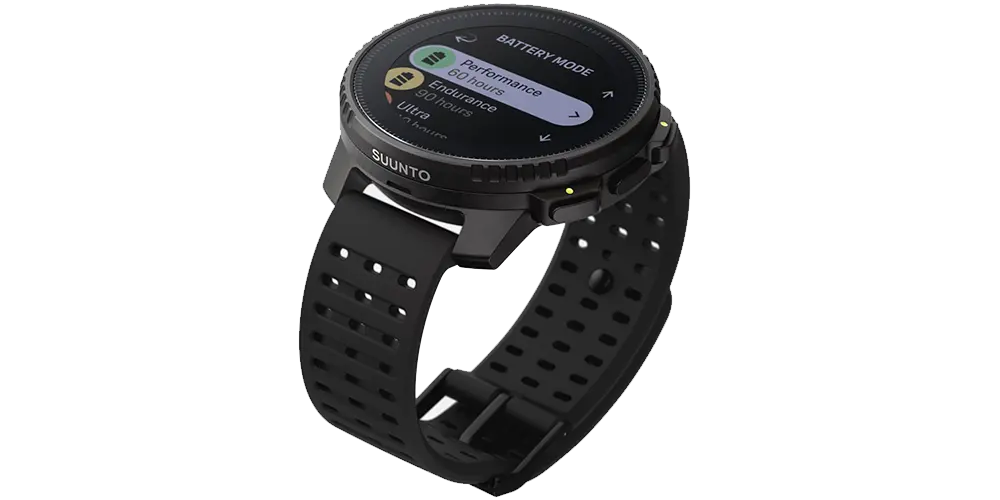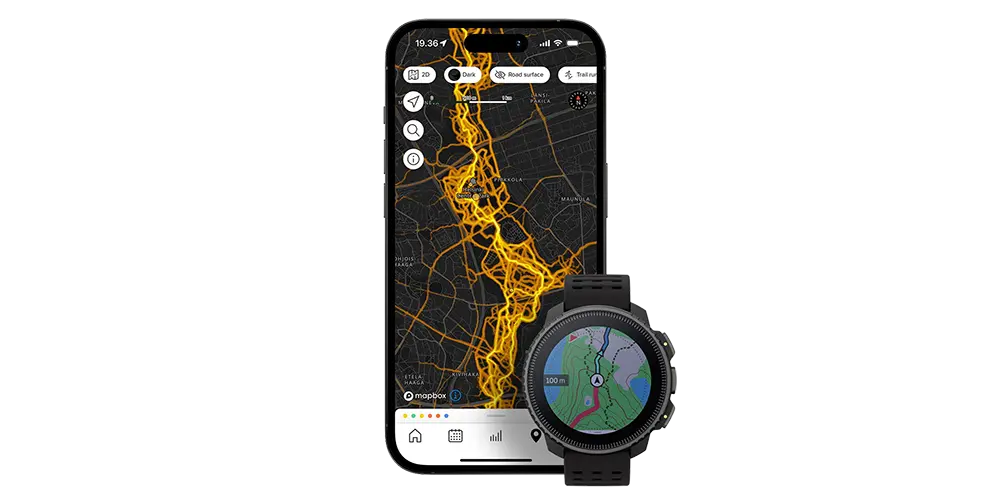Pros
- Long battery life
- Integrated mapping
- GPS and cardio accuracy
- Simple and complete Suunto app
Cons
- Interface is not the fastest
Designed for adventurers, the Vertical watch marks a turning point for Suunto with the addition of mapping and solar charging. The new Finnish spearhead is thus positioned opposite the sharpest outdoor multisport watches.
Overview
Partially renewed in 2022, the range of multisport watches from the Finnish company Suunto is being expanded with a Vertical that succeeds the Suunto 7 and the Ambit3 Vertical, taking the suffix of the latter. This watch nevertheless builds on the foundations introduced by the Suunto 9 Peak Pro, both in terms of construction and interface. However, the Suunto Vertical has a much larger size, which allows it to offer a record battery life and a larger screen, which is very useful for displaying its cartography.
Available in a steel version for £560, the Suunto Vertical is also available in a Titanium Solar version for £175 more, which, as its name suggests, features a titanium case and a solar ring surrounding the screen.
Ergonomics and design
With its Peak models, Suunto had accustomed us to compact watches. The Vertical certainly does not fall into this category with its 49 mm diameter case. However, this is a usual size in the world of outdoor multisport watches (Garmin Epix Gen 2, Polar Grit X Pro, Coros Apex 2 Pro…), which is not particularly shocking, especially as its thickness is kept under 14 mm (13.6 mm excluding the sensor island). A reasonably wide wrist is nevertheless preferable. We remain far from the discretion of a Suunto 5 Peak or 9 Peak Pro.

Despite its 74 g (86 g in the steel version), the Suunto Vertical does not feel too much on the wrist and is even quite pleasant to wear with its soft and non-irritating silicone strap, even when wet. The strap is well made, but unfortunately, it tends to get covered in dirt easily but is easy to clean. It will be easy to change it, as the watch accepts any standard 22 mm strap.
Well finished, the Suunto Vertical follows the construction principle of the Suunto 9 Peak Pro, with a case mixing fibre-reinforced polyamide and metal. Our test version, Titanium Solar, is made of titanium rather than steel for a more matt appearance, extraordinary lightness, and corrosion resistance. An essential point for swimming or sea diving enthusiasts, in particular. The watch also meets the US military MIL-STD-810H certification and is water resistant to 10 ATMs and IPX8 certified, making it suitable for water sports and recreational diving. Its depth gauge can be used for snorkelling to 10 metres.
We appreciate the presence of a sapphire crystal, which is very resistant to scratches. The same cannot be said of titanium, which is undoubtedly very resistant to shocks, but it does not appreciate the rubbing that can damage the aesthetics over time.
The Vertical’s sapphire crystal houses a 1.4-inch transflective MiP (Memory-in-Pixel) LCD with a 280 x 280 pixels resolution. Those hoping to enjoy the near-infinite contrast and brilliant colours of OLED will be disappointed. This technical choice is understandable since the MiP transflective technology offers unequalled readability in full sunlight and without backlighting, requiring it only in low light. This is a good choice for an outdoor watch, especially since Suunto has set new records for battery life with this Vertical.
However, we would have appreciated an even larger screen, given the large diameter (49 mm). If the borders are cleverly exploited in the Titanium Solar version, since they accommodate the solar panel, it is not the case on the steel version, flanked by 5 mm of black borders added to the 2 mm of the bezel. However, we can appreciate the apparent improvement in legibility compared to the 1.2-inch screen of a Suunto 9 Peak Pro, knowing that the Suunto Vertical’s screen is brighter overall.

Interface
The interface of the Suunto Vertical is functional in touch mode and can also be used entirely with the three physical buttons on the right-hand edge of the watch. This is essential, even if you have wet fingers or are wearing gloves. The touch screen can only be woken up by pressing one of the buttons. In everyday life, it is nice to navigate between the screens with the touchscreen and even more so to go back to the previous screen with a simple finger slide to the right. Otherwise, a long press on the middle (slower) button can only do this operation.
The same applies to scrolling through widgets, with the difference that you are exposed to very unpleasant jerks, which we also observed during our Suunto 9 Peak Pro test. Although the fluidity has improved with each update, it still needs improvement. It’s a shame because it detracts from the user experience and can give the impression of an underperforming watch, even though it doesn’t detract from its capabilities or accuracy.
Fortunately, menu navigation is quite fluid. The functions and tools (map, compass, journal, media controls, stopwatch, alarms, torch and other settings) are accessed with a simple bottom button or a finger swipe upwards. An opposite swipe or press of the button gives access to the different sports modes. You confirm your choice by touching or pressing the middle button. Simple and effective.
The display of the sports modes and widgets can be customised in the Suunto app. The SuuntoPlus Store can also be used to download small applications during your activities. One or two specific screens per sport mode can then be added to get an effort measurement with Strava, TrainingPeaks information during cardio workouts, Climb for trail running, etc.
The Suunto Vertical primarily focuses on its sports functions, as there are few connected functions. The display of notifications is rather basic (no support for emoticons, name of the app not always indicated), without the possibility of consulting the whole of an SMS or replying to it. The watch does, however, offer helpful widgets for sports use, including one dedicated to weather forecasts and air quality. There are controls for controlling the music played on the smartphone, but no music can be stored directly in the watch, despite its 32GB memory capacity. The latter is reserved for maps that can be downloaded from the Suunto application (by region). Fortunately, these are transferred to the watch via Wi-Fi, which is much faster than Bluetooth.

Uses and accuracy
Suunto’s flagship watch has all the sensors you’d expect: gyroscope and accelerometer, compass, barometric altimeter and depth gauge – with electrodes to detect immersion automatically.
Despite appearances, its optical cardio module (by LifeQ) differs from the 9 Peak Pro. It also houses a SpO2 sensor. Its accuracy is perfect during activities at a regular pace and remains quite adequate during split exercises, provided that the wrist does not wobble too much. Indeed, as the watch is imposing and rather heavy, it moves more on the wrist, which can cause measurement errors. It is better to take care to adjust it well and to tighten it.
A thin wrist, overly constricted vessels (e.g. due to cold) and a tight fit can cause heart rate measurement errors, as shown in the curves below. We can see that they only get closer together from the middle of our split run (10 peaks corresponding to the 10 accelerations of 30 s), which corresponds to the moment when we readjusted the watch (re-centring and tightening it to the maximum) after observing that it was showing a strangely low heart rate. Not everyone will encounter this kind of problem, which is true of many sports watches, but it is worth ensuring that the watch fits appropriately on the wrist.
Practical for running and trail running, the power calculation is available on the Suunto Vertical to better consider the difference in altitude. For greater reliability, external sensors can also be paired via Bluetooth: chest belt or armband, power sensor, cadence sensor, etc.
Thanks to its new dual-frequency GNSS chip (GPS, Galileo, Glonass, Beidou), the Suunto Vertical offers excellent geolocation accuracy, making it one of the best outdoor watches in this respect. It is one of the few connected watches capable of identifying which side of the road you are running on, for example. Its dual frequency also ensures it doesn’t lose its footing in a forest or the middle of buildings. The tracks obtained are thus faithful, with few deviations.
Let’s quickly move on to the reliability of the sleep tracking, as the Vertical does not do any better here than other Suunto watches. You must make do with a score calculated based on total sleep time and deep sleep cycles. However, bedtime and wake-up times are well detected; this sleep tracking estimates our energy and recovery levels. A calculation of heart rate variability would have been welcome to complete these analyses.

Battery life
To call the Suunto Vertical a marathon runner would not be enough to praise its excellent battery life. The watch is, in fact, capable of enduring around sixty hours of operation in its most precise geolocation mode (Performance mode: dual frequency GNSS with the acquisition of one position per second), which we were able to verify in practice by noting a consumption of around 3% for 2 hours of activity.
This time rises to 90 hours in Endurance mode (single frequency), sufficient for a clean environment. It even reaches 120 h in Ultra mode, which stops the GNSS chip for half a second between each position capture without reducing the acquisition frequency (1 Hz). We did not notice any significant degradation in accuracy with this mode, as long as you remain in an open environment, in the countryside, for example. Only the Tour mode significantly reduces accuracy, and for a good reason: it only records a position every 10 minutes – with the use of dual-frequency GNSS despite everything, enough to last up to 500 hours in the context of an expedition lasting several days without the possibility of recharging, for example.
Suunto also claims up to 30 days of battery life in connected watch mode. We found that it would take about twenty days during our test, which included about ten hours of sport, so 2 hours outdoors with geolocation.
For those who need even more battery life, Suunto assures us that the solar version (Titanium Solar) of its Vertical can gain around 30% of its endurance if exposed to the sun’s heat (50,000 lux). The announced battery lives then increase to 85 h (Performance mode), 140 h (Endurance), 280 h (Ultra) and 30 days in Tour mode. This is gargantuan! The steel version’s battery life should satisfy the vast majority of owners.
Conclusion
The Vertical illustrates Suunto’s revival. The Finnish watch is robust and very durable without compromising on precision. It is ready for adventure thanks to very useful excursion cartography. We prefer it to the other Suunto Peak for the latter and the most demanding uses, provided that we have a wrist wide enough to welcome its 49 mm. Interesting to gain a few hours of battery life, the solar titanium version will interest those who want a lighter watch.


